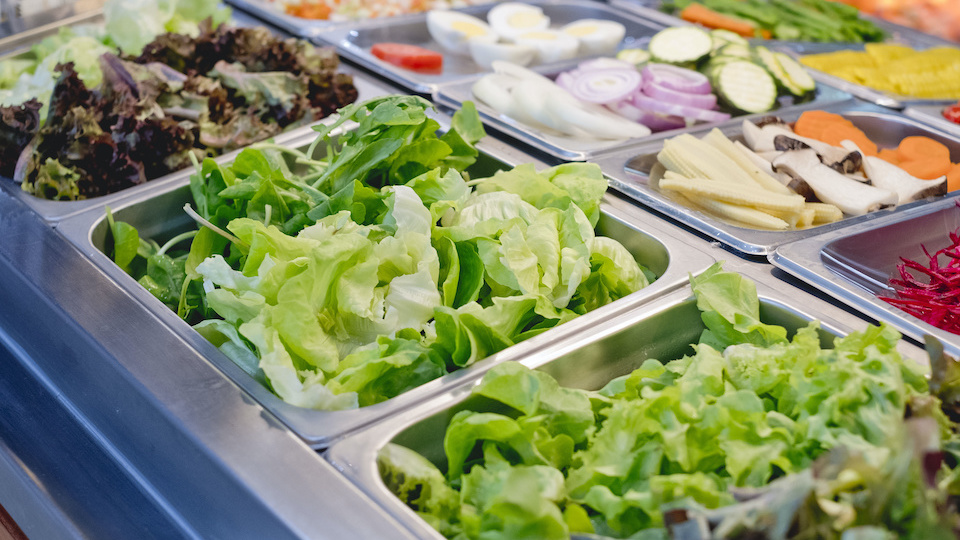A salad bar is the ultimate freedom in eating out. You get to choose just what you want on your healthy lunch or dinner. And the options are better than ever; your choice of lettuces and greens, shiny cherry tomatoes, hard-boiled eggs, peppers, cheeses, seeds, nuts, and the list goes on.
A well-prepared salad bar is hard to resist. It looks clean, sparkling, plentiful, and tasty. But there are many reasons not to hit up the self-serve salad. Once you hear some of the facts about salad bars, you’ll never go back again. You may even be inspired to grow your own salad bar, right in your backyard.
Food waste is huge at the salad bar
If you care about food waste and the environment, you may want to ban the salad bar. The foods on the salad bar cannot be repackaged and sold at the end of the day. They have reached the end of their sellable lifespan. So, what happens to all that lettuce, the cut vegetables, the fruit, and salad dressing? It gets tossed.
Self-serve food bars were created for our convenience and so that we have options, but it comes at a cost. A lot of food ends up going to waste. It’s impossible for a store or restaurant to perfectly plan how much food to put on the bar. And, to keep the salad bar looking nice, they usually top up the bins, even toward the end of the day.
Salad bars are the garbage bins for the produce section
When food gets close to its sell-by date, a grocery store may discount it first, but then it gets tossed. A lot of stores have an intermediate step: repurpose the food for the salad bar or deli. When that bag of washed lettuce is on its last day, no one will buy it. Dump it into the salad bar, and consumers are none the wiser.
Eating at the salad bar often means you are eating the store’s least fresh produce. This doesn’t necessarily mean it is unsafe, but it may not taste the best, and it won’t have as many nutrients as the fresher foods.
Grocery store produce is already old
Grocery store produce is not as fresh as you may think, even before it is consigned to the salad bar. Fruit and vegetables take a long journey from farm to table, often spending weeks or months in storage. Apples, for instance, may be ten months or older once you buy them in the store. Even lettuce gets stored for weeks. That less-fresh produce you get on the salad bar is even older than you think.
Salad bars carry germs
Restaurant and grocery store workers handle the food on a salad bar to process it. Then, the food sits all day in a container on the bar. People use tongs—hopefully—to reach in and grab items. They touch those to their plates and put them back.
This leaves a lot of room for bacteria to take hold in the foods on a salad bar. To prevent the spread of illness, the foods must be handled and prepared safely, kept at a cool temperature on the salad bar, and handled safely by consumers.
The hard truth is that do abound, despite safety protocols. A study from the National Science Foundation, for instance, found that salad bar and buffet trays are among the germiest items found in public places. Just imagine what’s on the salad tongs.
Not everyone follows the rules at the salad bar
As long as the grocery store or restaurant follows safety protocols and those eating at the salad bar follow the rules, it should be safe, right? Sure, but do people really follow the rules? Thanks to video-sharing online, we know that not everyone does. In 2018, a disturbing video made the rounds showing a man sipping directly from the soup ladle at a food bar. He takes a sip and puts it right back in the soup. It’s enough to turn anyone’s stomach and make you ditch the salad bar for good.
COVID-19 has made salad bars even less safe
As if the usual cold, flu, and bacterial infections you risk at the salad bar were not enough, now we have this pandemic to consider. It’s a sinister virus, causing symptoms in some people but not others. A person may feel perfectly fine but spread the virus over a salad bar by breathing or coughing.
As restaurants reopened after mandated shutdowns, the Centers for Disease Control and Prevention recommended putting all self-serve food out of commission. It’s just too risky to have people who could be hosting the virus touching serving spoons and breathing over communal food. If any restaurants have ignored this recommendation and still have a salad bar, avoid it. The risk is not worth getting a mediocre, self-prepared salad.
Grow your salad bar
All of these are great reasons to ditch salad bars, and the grocery store produce section. A salad garden at home is rewarding, safer, and healthier. Lettuce is especially easy to grow. You can even start it from seed in a container and grow fresh lettuce indoor year-round. Grow peppers, cucumbers, tomatoes, and peas, and you have a salad right in your backyard.
Food safety is a real concern, but when you grow your food, you know where it has been, who has handled it, and what pesticides or chemicals have been used or avoided. Gardening is the ultimate way to take control of your family’s health and nutrition. It also means you can avoid relying on germy, old, salad bar salads.
-Mary Ellis




